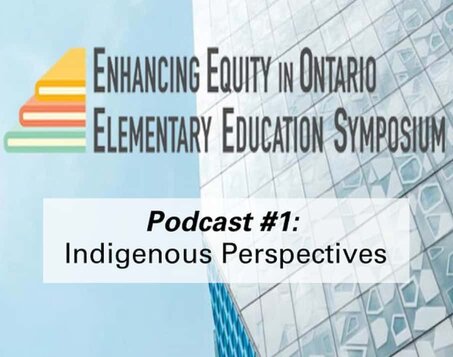You are now in the main content area
Podcasts

Hosted by Stephen Hurley (Executive Director at voicEd Radio) and Dr. Nicholas Ng-A-Fook (Professor and Vice Dean of Graduate Programs, University of Ottawa), who are joined by:
- Kiera Brant-Birioukov - Kanyen’kehà:ka from Kenhtè:ke (Tyendinaga Mohawk Territory), Assistant Professor at York University. Kiera’s work and research are grounded in Haudenosaunee thought, educational theory, philosophy, autobiography, and Creation Stories. She has published work on Indigenous teacher education, curriculum theory, reconciliatory pedagogies, the phenomenon of Indigenous resilience, adaptation and ingenuity in Canada. She is currently working with the Frederick W. Waugh project to repatriate historical documents of Haudenosaunee culture, life, and stories to community members in the creation of educational resources and materials. (https://edu.yorku.ca/edu-profiles/index.php?mid=1986777 (external link) ).
- Kyrstin Dumont - Band member of the Algonquins of Kitigan Zibi, advocate, educator, and mentor. Kyrstin is a strong role model for other students who have fallen through the cracks of mainstream colonial education systems. She has spoken on Parliament Hill about climate justice and human rights, as well as in the House of Commons where she spoke about the missing and murdered Indigenous women and girls genocide within Canada. (https://www.instagram.com/kyr.dumont/ (external link) )
- Stephanie Sanders - Ojibwe Anishinaabekwe from Curve Lake, blended with Spanish and French. Stephanie is an M.Ed student at the University of Ottawa, and an Indigenous Education Learning Partner with the Ottawa Catholic School Board, where she supports educators in incorporating a Two-Eyed Seeing, Land Based pedagogy into their practices. She also supports educators’ efforts in Truth & Reconciliation, and developing respectful relationships with Indigenous community members.
- Marissa Magneson - Cree-Métis artist, photographer, educator, workshop facilitator, and PhD student in the Faculty of Education at York University. Marissa holds a Honours BFA degree and Master’s in Indigenous Studies. Her work is centered around decolonizing education, strengthening community, and reclaiming cultural practices. She is the elected Youth Representative for the Toronto and York Region Métis Council. (https://www.marissamagneson.com/ (external link) & https://www.instagram.com/magnesonstudios/?hl=en (external link) ).
- Roxanne Gillis - Indigenous MEd student at York University, with a double major in Indigenous studies and Gender and Women’s studies. Roxanne is currently an Indigenous consultant for the City of Toronto, and as a human trafficking survivor, she works with the Native Women’s Association of Canada on a Seeing Ourselves Advisory Council/Healing Project.
- Melissa Somer - Saulteaux Anishinaabekwe from Little Saskatchewan of the Interlake tribes, Buffalo Clan, blended with Pennsylvanian Dutch. Melissa is an Early Childhood Educator and graduate of the Urban Indigenous Teacher Education program from York University, and is currently completing her Masters of Urban Indigenous Education. She is a facilitator, educator, and presenter for George Brown College, York University, and the TDSB.
In this podcast, participants shared their perspectives on equity, informed by their Indigenous worldviews and lived experiences. The discussion was guided by the following questions:
- What is equity for each of you in terms of your lived experiences and in terms of your current work in relation to settler colonial K-6 public and private schooling systems in Ontario?
- What are some of the historical and/or ongoing individual, structural, systemic and societal barriers?
- What are some of the professional (un)learning work taking place to counter and/or support students?